Key Takeaways
- Dubai offers a zero‑income‑tax environment that attracts high‑net‑worth individuals.
- Investor‑visa programmes make residency straightforward for property owners and business founders.
- World‑class infrastructure-airports, ports, and free zones-supports global business operations.
- Luxury amenities, from yachts to desert resorts, create a lifestyle many wealthy people crave.
- Safety, political stability, and a multicultural community make Dubai a comfortable long‑term home.
Direct Answer
Most millionaires in Dubai are drawn by the city’s tax‑free status, flexible residency options, and a luxury‑focused lifestyle that blends business efficiency with leisure.
What Makes Dubai a Magnet for the Wealthy?
When you hear that Dubai hosts a disproportionate number of high‑net‑worth individuals, the first thing to ask is: what does the city actually offer? Below we break down the core drivers-tax, business, lifestyle, and safety-that turn Dubai into an elite enclave.
Defining the Landscape
Dubai is a global city in the United Arab Emirates known for its ultra‑modern skyline, zero‑tax policies, and status as a commercial hub. It sits at the crossroads of Europe, Asia and Africa, making it a natural gateway for international trade.
Millionaire refers to an individual whose net worth exceeds one million US dollars, often measured in assets like cash, property and investments. For these individuals, the choice of residence is less about affordability and more about protecting wealth, simplifying business, and enjoying a premium lifestyle.
Tax Advantages That Speak Volumes
Tax haven describes a jurisdiction offering low or zero tax rates, minimal reporting requirements, and favorable legal frameworks for wealth preservation. Dubai fits this definition perfectly: there is no personal income tax, no capital gains tax, and corporate tax is limited to specific sectors.
This tax environment means a millionaire can keep more of what they earn, reinvest in new ventures, or simply enjoy a higher disposable income.
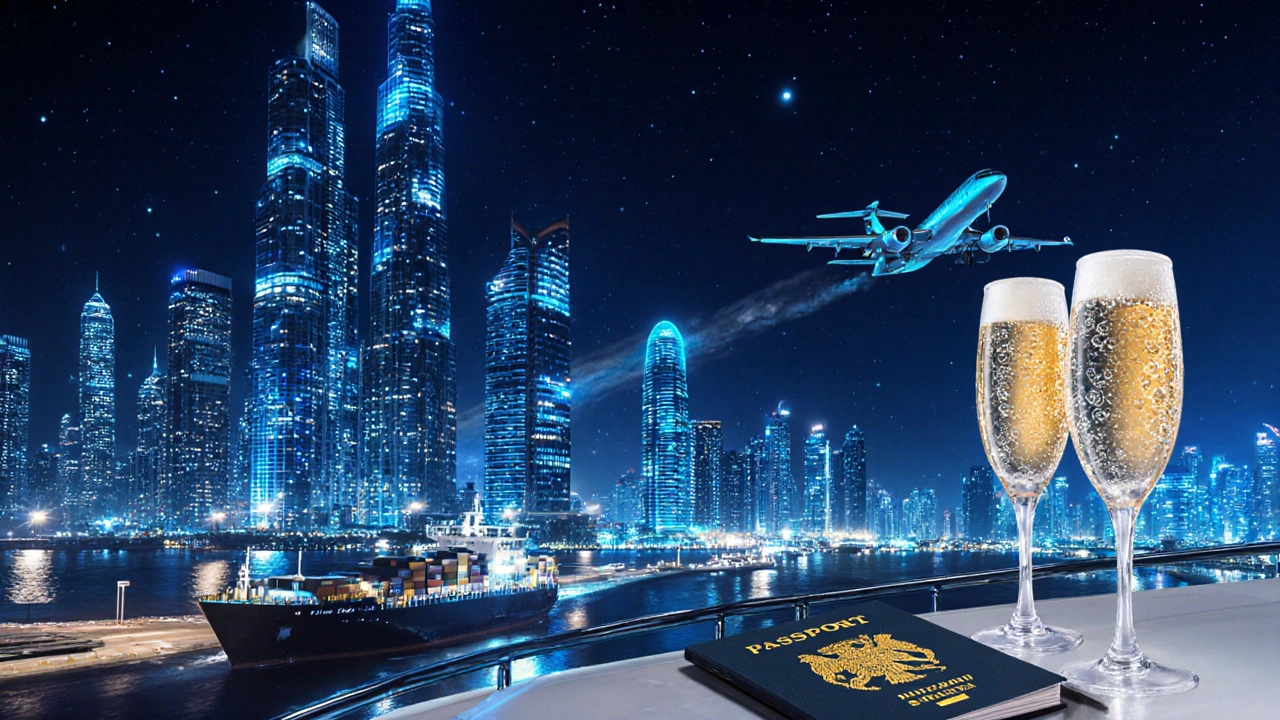
Residency Options Tailored for Wealth
Dubai’s government has introduced several visa pathways that grant long‑term residency to high‑net‑worth individuals:
- Investor Visa: Requires a minimum investment of AED 10million (≈USD 2.7million) in a local company or a capital‑intensive project.
- Property Visa: Grants a three‑year stay for owners of property worth at least AED 2million (≈USD 540k).
- Retirement Visa: Open to retirees with a monthly income of AED 20,000 (≈USD 5,400) or savings of AED 1million.
These visas are renewable, family‑inclusive, and come with full access to the city’s public services.
Business‑Friendly Regulation
Free zone is a designated area where companies can operate with 100% foreign ownership, no import/export duties, and simplified licensing. Iconic zones like JAFZA (Jebel Ali Free Zone) and DIFC (Dubai International Financial Centre) attract multinational firms, startups, and family offices.
The combination of zero‑tax corporate policies and ease of setting up a company means a millionaire can launch or relocate a business in weeks rather than months.
Luxury Lifestyle That Matches the Wallet
From world‑renowned hotels to private islands, Dubai’s luxury market is built for the ultra‑rich:
- Yacht clubs along the Marina host vessels over 100feet long.
- Designer boutiques on the Mall of the Emirates and Fashion Avenue showcase the latest couture.
- Five‑star dining experiences feature Michelin‑star chefs from around the globe.
- Desert resorts offer exclusive safaris, spa retreats, and private villas.
All these amenities are backed by a safety record that places Dubai among the world’s lowest‑crime cities.
Connectivity That Keeps You Global
International airport refers to a major hub that handles both passenger and cargo flights worldwide. Dubai International Airport (DXB) ranks among the busiest for international passenger traffic, offering non‑stop links to over 240 destinations. This connectivity makes weekend getaways or business trips seamless.
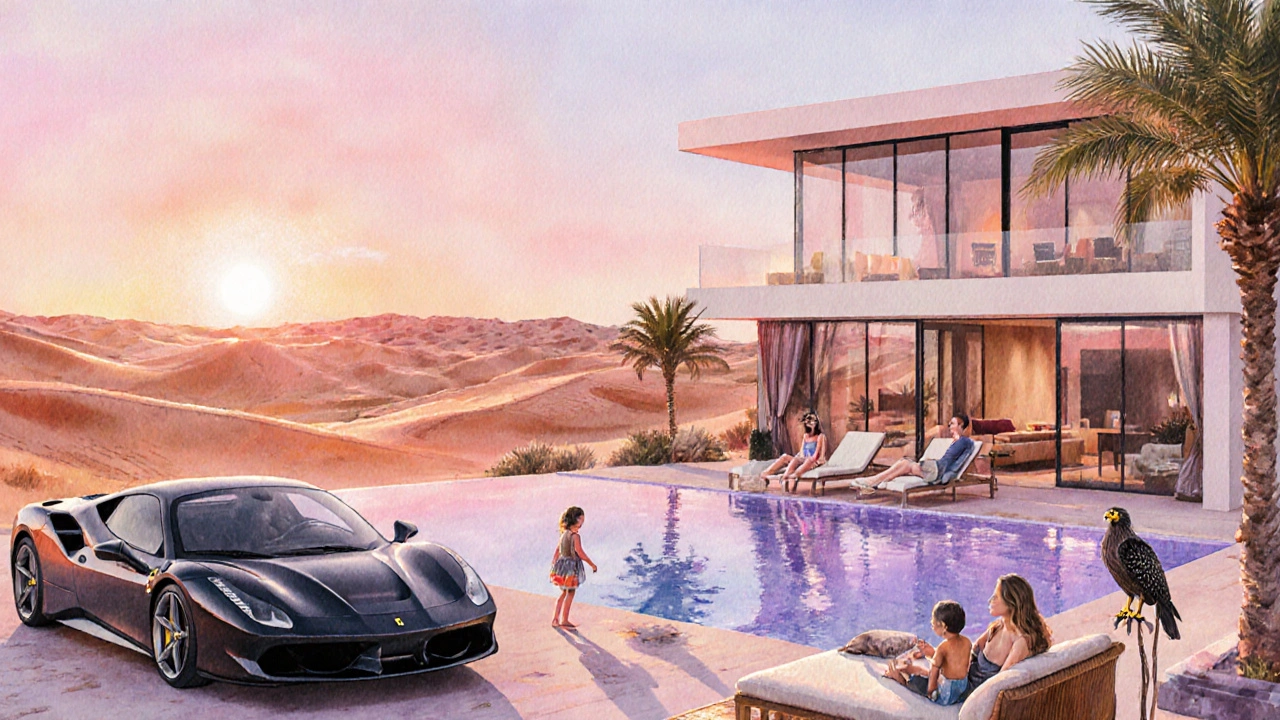
Real Estate Opportunities
The property market is a key draw for wealthy investors. Popular districts include:
- Palm Jumeirah: Man‑made island with waterfront villas and private beaches.
- Dubai Marina: High‑rise apartments with marina views.
- Downtown Dubai: Proximity to Burj Khalifa and luxury shopping.
- Emirates Hills: Gated community often called the “Beverly Hills of the Middle East”.
Properties can be purchased outright with no foreign‑ownership restrictions, and rental yields hover around 5‑7% annually, providing both lifestyle and investment benefits.
Cost of Living - Not As High As You Think
While luxury is abundant, everyday costs can be managed wisely:
| Category | Average Cost (USD) |
|---|---|
| Housing (luxury villa) | 15,000‑30,000 |
| Schooling (international) | 2,000‑4,000 per child |
| Transportation (fleet of cars + driver) | 5,000‑10,000 |
| Dining & Entertainment | 3,000‑8,000 |
| Healthcare (private insurance) | 1,000‑2,500 |
Because there’s no income tax, the net disposable income often exceeds that of comparable cities with higher tax burdens.
Dubai vs. Singapore: A Quick Comparison for the Wealthy
| Factor | Dubai | Singapore |
|---|---|---|
| Personal Income Tax | 0% | 0‑22% (progressive) |
| Corporate Tax | 0‑9% (limited sectors) | 17% |
| Residency Investment | AED 10M (≈USD 2.7M) | SGD 2.5M (≈USD 1.8M) in approved funds |
| Cost of Luxury Housing | USD 1.5‑3M for beachfront villa | USD 2‑4M for prime condo |
| Safety Index | 85/100 (low crime) | 87/100 (very low crime) |
| Ease of Business Setup | 2‑3 weeks (free zones) | 4‑6 weeks (standard) |
| Leisure Options | Desert safaris, yachts, 7‑star hotels | Golf courses, island resorts, world‑class dining |
Both cities score high on safety and quality of life, but Dubai’s zero‑tax regime and faster business setup make it more attractive for many millionaires.
Next Steps for Aspiring Dubai Residents
- Consult a qualified tax advisor to understand how Dubai’s policies fit your global portfolio.
- Identify the visa route that aligns with your investment level and family needs.
- Engage a reputable real‑estate broker who specializes in high‑end properties.
- Set up a corporate entity in a free zone to capitalize on 100% foreign ownership.
- Plan a scouting trip: spend a few days exploring neighborhoods, schools, and lifestyle venues.
Frequently Asked Questions
Is there any hidden tax for millionaires in Dubai?
No personal income tax or capital gains tax applies. The only major levy is a 5% municipal tax on hotel stays and a 10% VAT on most goods and services.
Can I keep my foreign bank accounts while living in Dubai?
Yes. Dubai residents freely maintain offshore accounts in jurisdictions such as Singapore, Switzerland or the Cayman Islands. There is no local reporting requirement for foreign assets.
What is the minimum property value for a residence visa?
The property must be worth at least AED 2million and be fully paid‑off (no mortgage) to qualify for a three‑year visa.
How long does it take to set up a company in a free zone?
Typically 2‑3 weeks, provided all documents (passport, bank reference, business plan) are in order.
Is Dubai safe for families?
Crime rates are among the lowest in the world, and there are numerous international schools, health facilities, and family‑friendly neighborhoods.

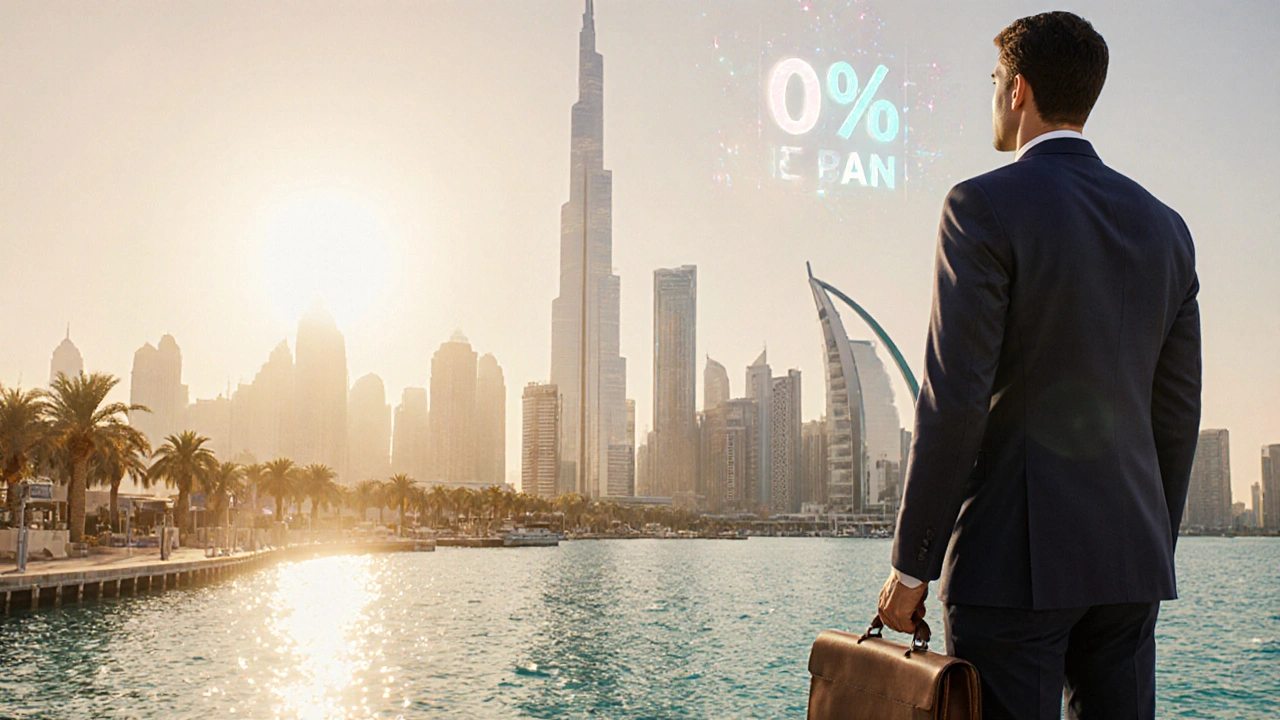
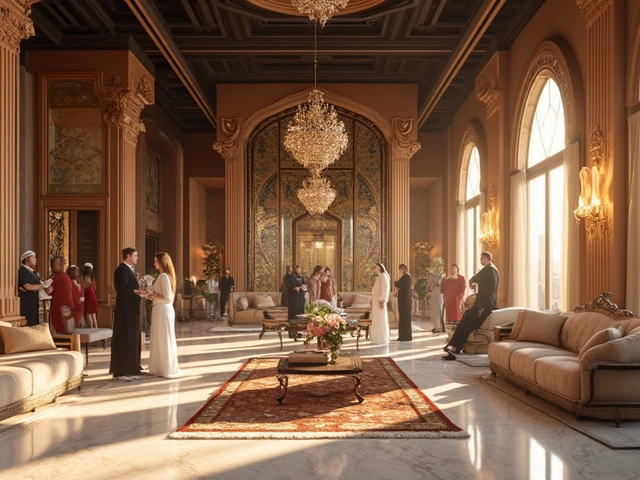
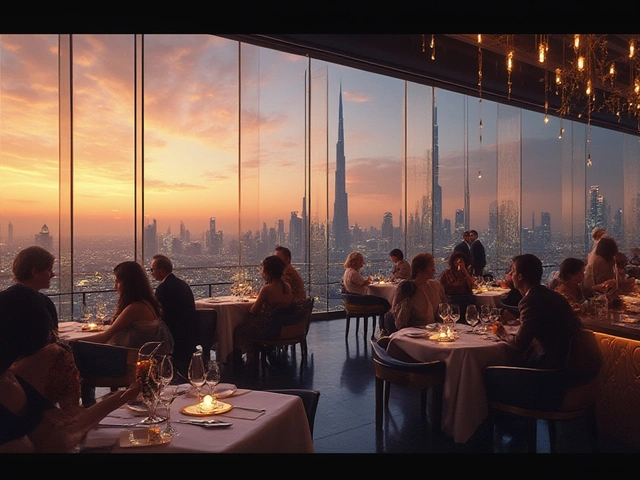
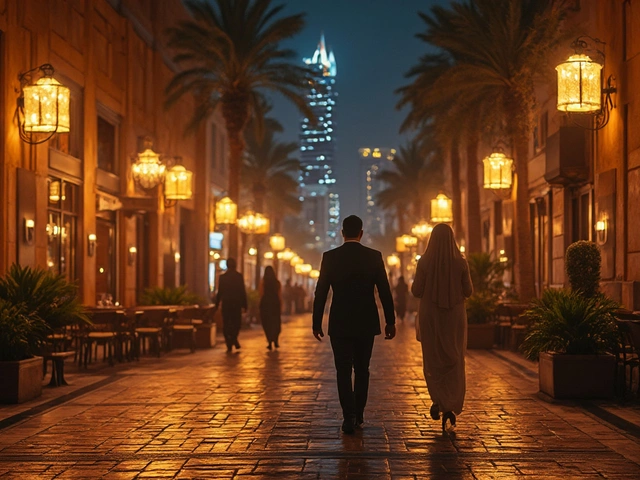
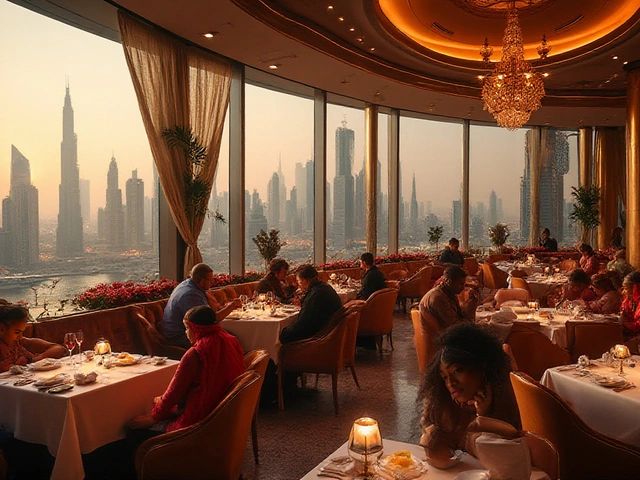
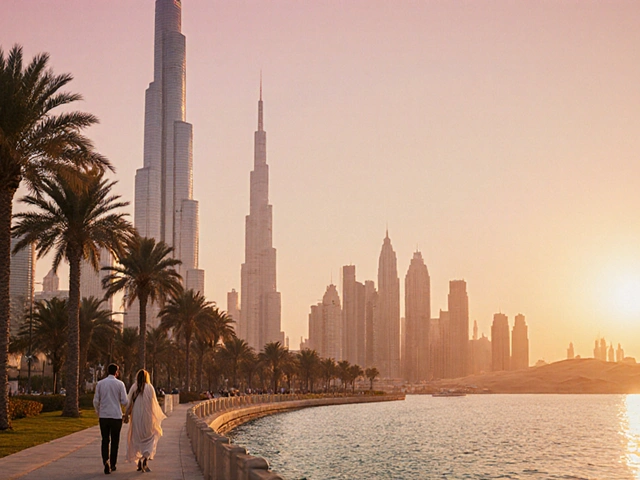

Lippard Babette
October 12, 2025 AT 14:39Wow, the tax‑free vibe in Dubai really does sound irresistible for anyone with a sizable portfolio. The ease of getting a residency visa just by owning property is a game‑changer. Plus, the city’s safety record makes it feel like a secure playground for families. I can totally see why the luxury lifestyle meshes so well with business efficiency. Definitely worth a deep dive if you’re weighing your options.
Srimon Meka
October 14, 2025 AT 05:32Listen, the allure isn’t just about dodging taxes; it’s about reshaping the very concept of wealth stewardship. When you relocate to a place that rewards entrepreneurship with almost no fiscal drag, you’re essentially rewriting the rules of value creation. Dubai’s free‑zone model strips away bureaucratic shackles and forces you to confront what truly drives profit. It’s a bold statement against complacent fiscal systems, and that kind of aggression fuels progress.
Cheryl Ying
October 15, 2025 AT 17:39Honestly, glorifying tax havens while ignoring global inequality is just plain selfish.
William Driscoll
October 17, 2025 AT 02:59The article correctly outlines the zero personal income tax, but it glosses over the 5 % municipal fee on hotel stays and the 10 % VAT on most goods, which can affect net disposable income. Moreover, while corporate tax is limited, entities operating in the energy sector still face a standard 9 % rate. Residency visas, as listed, require fully paid‑off properties, which eliminates leverage options for some investors. Free‑zone benefits, such as 100 % foreign ownership, are indeed attractive, yet they come with annual licensing fees that vary by jurisdiction. Luxury amenities are abundant, but the cost of maintaining multiple high‑end assets can erode the perceived tax advantage. In terms of connectivity, DXB’s hub status is undeniable, but congestion and slot allocation can be a bottleneck for frequent flyers. Lastly, the comparison with Singapore is useful, though it omits Singapore’s robust legal framework and political stability, which many high‑net‑worth individuals also weigh heavily.
matthew mcclane
October 18, 2025 AT 09:32Dubai’s safety record and multicultural environment make it a solid choice for families seeking stability. Combined with tax incentives, it’s a pragmatic move.
Emmanuel Jolly
October 19, 2025 AT 13:19When we contemplate the notion of “tax haven,” we must first interrogate the very moral scaffolding upon which such a construct rests. Is the pursuit of fiscal efficiency an act of financial prudence, or does it betray a deeper complacency toward global economic disparity? Dubai’s zero‑tax policy undeniably offers a sanctuary for wealth, yet it simultaneously cultivates a micro‑economy insulated from the redistributive mechanisms that many societies deem essential. One could argue that the city’s meteoric rise is a testament to visionary governance, but at what ethical price does that vision materialize? The free‑zone model, while brilliantly designed to attract capital, also engenders a parallel legal universe where standard labor protections can be sidestepped. Moreover, the glittering veneer of luxury resorts and private islands masks the lived reality of migrant laborers who construct these marvels under arduous conditions. In examining the fiscal calculus, the 5 % municipal tax and 10 % VAT may appear negligible, yet they serve as subtle reminders that no system is entirely devoid of levy. The broader geopolitical implications cannot be ignored; the influx of high‑net‑worth individuals reshapes local markets, inflating property values and displacing long‑time residents. The resulting socio‑economic stratification poses a challenge to the city’s proclaimed cosmopolitan ethos. Nevertheless, the strategic geographic positioning-at the crossroads of Europe, Asia, and Africa-offers unparalleled connectivity that fuels global trade. This advantage, coupled with a stable political climate, creates a compelling proposition for business founders seeking a foothold in emerging markets. From a philosophical standpoint, one must weigh the individual’s right to optimize wealth against the collective responsibility to contribute to societal welfare. The balance is delicate, and each investor must navigate it with both acumen and conscience. Ultimately, Dubai’s allure is multifaceted: tax efficiency, rapid business setup, and an opulent lifestyle. Whether these attributes outweigh the underlying ethical considerations remains a personal calculus that each millionaire must resolve.
Krishna Prasad Regmi
October 20, 2025 AT 14:19Don’t let the paperwork scare you-once you lock in that investor visa, a world of opportunities opens up instantly. Leverage the free‑zone benefits to accelerate your venture and reinvest those savings into growth. Keep your vision sharp and your network tighter.
zulfa eliza
October 21, 2025 AT 12:32Your enthusiasm is spot‑on, but remember that sustainable success also hinges on cultural adaptability. Embrace the local customs, and you’ll find partnerships that go beyond mere transactions. The blend of confidence and respect will set you apart in Dubai’s fast‑paced arena.
Lauren de Bruyn
October 22, 2025 AT 07:59Notice how the article swears there’s “no hidden tax” while conveniently ignoring the subtle 5 % municipal levy-classic selective reporting. Also, “AED 10M” should be written as “AED 10 million” to avoid ambiguity.
akash gupta
October 23, 2025 AT 00:39From a fintech perspective Dubai’s ecosystem provides a low‑friction AML regime ideal for crypto asset onboarding. The latency in cross‑border settlement drops dramatically thanks to the hub’s Tier‑1 data centers. Scale your portfolio with minimal cost‑of‑capital overhead.